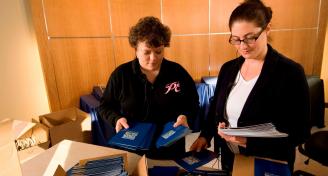Setting the Stage: Best Practices for Working With Your Guest Speaker
You outlined your goals.
You did your research.
You interviewed countless speakers.
You made your short list and traveled to events to see them in action.
You weighed all pros and cons.
You selected your speaker!
Congratulations. Is now a good time to mention that selecting and booking the speaker is only the tip of the iceburg?
Yes, really.
Don’t get me wrong, selecting the right speaker is no easy feat and is a great start to the process, but accomplishing your goals and getting the best out of your chosen speaker requires a lot more. Working closely with your speaker throughout the planning process will ensure a positive outcome for all stakeholders.
Work Directly With Your Speaker
Before signing the contract, ensure that you will have the opportunity to work directly with your speaker through the planning process. Once the contract is signed, the first thing to do is schedule a meeting directly with the speaker. During this first meeting, you can each talk about the best way to work together and establish the framework for the relationship moving forward. Subsequent meetings should also be scheduled so that you may provide your speaker with real-time information regarding goals, program content, attendee demographics, and allow your speaker the opportunity to learn as much as possible about your group to offer the best experience to your attendees.
Your speaker should also be invited to attend planning and strategy meetings with your critical stakeholders. He or she may be able to glean critical information from these interactions that can make the difference between a great presentation and a brilliant presentation.
Don’t Neglect the Logistics
While scheduling the meetings with your speaker, make sure to also put logistics meetings on the calendar with whomever is handling that aspect of the planning on the speakers’ team. The logistics point of contact for the speaker should be kept apprised of all arrangements made for the speaker while he or she is at the program (i.e. hotel, transportation, etc), and all on-site logistical details, including which group functions the speaker is invited to attend, when pre-presentation briefings are scheduled, when rehearsals are scheduled, etc. All of this information should be documented in a briefing packet that is sent to the speaker pre-event. A final briefing packet should be provided to the speaker upon arrival.
Identify the Team
If you don’t have the same person assigned to manage speaker content and speaker logistics, ensure that these people are communicating and coordinating appropriately. When different players are involved with different aspects of managing a speaker, it is crucial that all information is freely flowing both ways to ensure that every expectation is met. For example, if the person managing content happens to learn that the speaker requires a certain brand of water in the speaker ready room and this information does not make it to the logistics contact, then a would-have-been-easy-to-avoid crisis of epic proportions may have just been created (of course this is just a hypothetical example …).
An on-site point of contact should be introduced to the speaker and his or her team prior to the event. This introduction should also include an outline of the role the point of contact will play on-site so the speaker feels confident about all aspects of the program prior to arrival.
“The right speaker with the right content delivered the right way to your audience can measurably increase sales, increase performance, increase customer satisfaction, improve profits, expand engagement, recruit more volunteers, and more. Given the possible outcomes of a highly effective speaker, this is one of the most crucial elements of the planning process and requires a very strategic approach.” Don’t overlook or short-change the entire process of selecting and then managing your speaker(s). Make sure to give this highly strategic element of your program the time and attention it (and your speaker) deserves.
Your Turn
What strategies do you employ when working with speaker? Speakers, what are some of the best practices you've seen from planners?
Image courtesy of gozdeo





